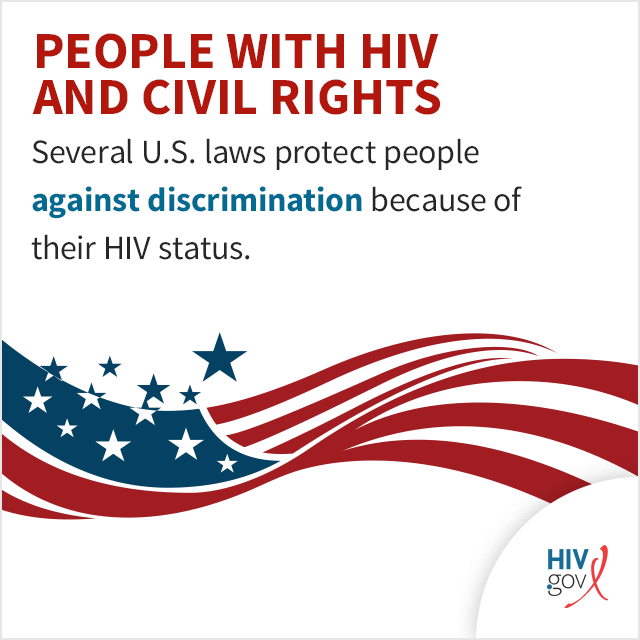Civil Rights
Topics

What Laws Protect People with HIV or AIDS from Discrimination?
If you have HIV or AIDS, you are protected against discrimination based on your HIV status under Section 504 of the Rehabilitation Act of 1973, the Americans with Disabilities Act of 1990 (ADA), and Section 1557 of the Affordable Care Act. Under these laws, discrimination means that you are not allowed to participate in a service that is offered to others, or you are denied a benefit because you have HIV.
How Do These Laws Protect Against Discrimination?
Section 504, the ADA, and Section 1557 prohibit discrimination against qualified persons, including those with HIV or AIDS.
The ADA prohibits discrimination by employers, places of public accommodation, and state and local government entities. Section 504 prohibits health and human service providers or organizations that get federal funds or assistance from discriminating against you because you have HIV or AIDS. Section 1557 prohibits discrimination based on race, color, national origin, age, sex (including pregnancy, sexual orientation, or gender identity), or disability (including HIV or AIDS) in certain health programs or activities.
Examples of entities that may be covered by the ADA and/or Section 504 include hospitals, clinics, social services agencies, drug treatment centers, nursing homes, doctors’ offices, dentists’ offices, daycares, public pools, and fitness gyms. Again, under these laws, discrimination means that you are not allowed to participate in a service that is offered to others, or you are denied a benefit because you have HIV. The ADA also protects your family and friends from discrimination because of your HIV status, based on their association with you.
For more information, see OCR’s Know Your Rights Against Discrimination and Know the Rights that Protect Individuals with HIV and AIDS.
How Do You File a Civil Rights Complaint?
Your complaint must:
- Be filed in writing by mail, fax, e-mail, or via the OCR Complaint Portal.
- Name the health care or social service provider involved and describe the acts or omissions you believe violated civil rights laws or regulations.
- Be filed within 180 days of when you knew that the act or omission complained of occurred. OCR may extend the 180-day period if you can show "good cause.”
Language assistance services for OCR matters are available and provided free of charge. OCR services are accessible to persons with disabilities. For assistance, call Toll-free (800) 368-1019 or TDD Toll-free (800) 537-7697.
HIV/AIDS Discrimination Complaints: Success Stories
To read about successfully resolved HIV/AIDS discrimination complaints, visit the HHS webpage on Civil Rights Enforcement Success Stories Involving HIV/AIDS.
Summaries of resolutions to HIPAA privacy violations can be found here: Health Information Privacy Enforcement Examples.
What Is HIPAA?
The Health Insurance Portability and Accountability Act of 1996 (HIPAA) protects your health information privacy and gives you the right to review and make corrections to your medical records. OCR also enforces the Privacy Rule under HIPAA.
Read more about HIPAA and how your information may be used or shared.
How Do You File a HIPAA Complaint?
If you believe that your health information privacy rights have been violated, you can file a complaint with the HHS Office of Civil Rights (OCR). This office can investigate complaints against covered entities such as health plans, health care clearinghouses, health care providers that conduct certain transactions electronically, and their business associates. If you feel that you have been discriminated against by a health care provider or social service provider, refer to the HHS web page, How to File a Civil Rights Complaint. You may also want to refer to the HIPAA Privacy Rule information in the Complaint Portal Assistant.
For more information, see OCR’s Health Information Privacy, Protecting the Civil Rights and Health Information Privacy Rights of People Living with HIV, or How to File a Complaint.